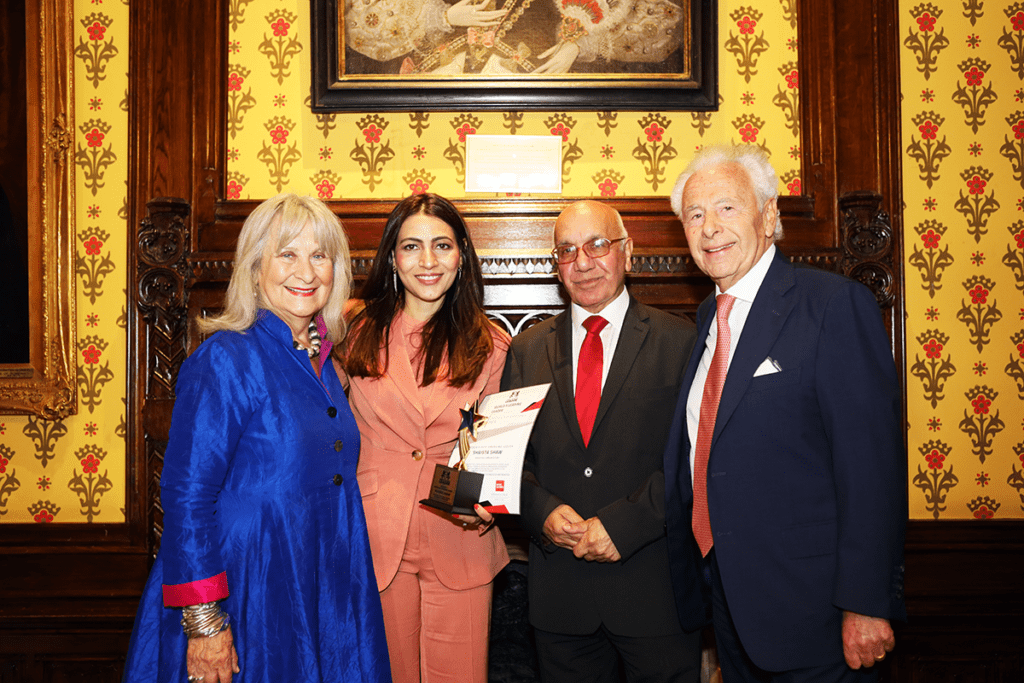
Selected as WCRCINT World’s Best Emerging Leader in Marketing, Shaista Shaw is a transformation marketing and communication leader who has delivered to fortify brand image and drive profitable revenue growth.
About Shaista Shaw – Shaista has over 17 years of management experience and a strong track record of driving results. Working with Fortune 500 companies worldwide, she has consistently demonstrated strong business results across organisational transformation, designing breakthrough marketing strategies, operations, sales, and product innovation, and creating strategic plans to drive sustainable business growth. Shaista is experience in delivering results for B2B and B2C, portfolios in several complex and disruptive industries, including technology, brand and financial and professional services. She is a commercial growth-driven leader who operates across complex global matrix businesses. With cross-discipline expertise in shaping global brand strategy, Shaista is known for developing vision, building talent and teams, and driving growth to win in the market. Shaista is collaborative and passionate about developing people and is focused on mentoring a new generation of business leaders to inspire higher levels of achievement. Over the last 17 years, by donning different hats across strategy consulting, business/channel management and marketing, she has thrived on business acumen, strategic insights, creative vision and a genuine sense of connection. Shaista has demonstrated consistent and strong results driving profit, sales, market share growth, cost reduction and new product innovation. Her multifaceted leadership experience motivates global, cross-functional teams to deliver on goals under a shared strategic brand vision.
WCRCLEADERS in conversation with Shaista Shaw
What makes a strong leader? What are your key leadership strengths are make the strongest attributes of success.
Strong leader possesses a combination of personal qualities, skills, and characteristics that enable them to effectively guide and inspire others towards a common goal. It’s important to note that leadership is not one-size-fits-all, and different situations may require different leadership approaches. According to me a strong leader is often someone who can adapt their style and skills to suit the needs of their team and the challenges they face. Leadership is a lifelong journey of growth and development.
I think its important for the leaders to have a the below qualities ;
Vision: Strong leaders have a clear and compelling vision of the future. Having a vision provides a sense of direction and purpose for the team.
Communication: Leaders must be able to convey their ideas and vision clearly, listen actively to others, and foster open and honest communication within the team.
Empathy: Empathy allows me to understand and connect with my team members on a personal level, which in turn builds trust and rapport.
Adaptability and Agility: As a leader its important to be flexible and adaptable in the face of change. One can adjust their strategies and approaches as circumstances evolve, making them resilient in challenging situations.
Decision-Making: To make timely informed decisions based on available information, considering the potential impact on the team and organization.
Problem-Solving: To be adept at identifying and solving problems. Encourage creative thinking and innovative solutions within the team.
Integrity: To operate with honesty and integrity. They lead by example and adhere to ethical principles, which fosters trust and respect among team members.
Team Building: Recognize and leverage the strengths of each team member while fostering collaboration and cohesion.
Motivation: To inspire and motivate their team members to give their best effort.
Resilience: I think one should also be able to handle setbacks and adversity with grace. The resilience in challenging times can inspire the team to persevere and stay focused on the long-term goals.

An accomplishment that you consider to be the most significant in your career? What challenges did you face to reach to the success.
My biggest achievement was growing profitable for my company in Germany wherein they were struggling to review over the past 10 years.
Transforming this struggling business into a successful and profitable one is my significant achievement that required dedication, strategic thinking, and hard work. Consistency, adaptability, and a customer-centric approach are key to turning a struggling business into a profitable one through effective marketing activities.
What is a role of leader in these challenging times. List 5 in order of priority.
The role of a leader in challenging times is crucial for guiding their team or organization through uncertainty and adversity. Here are five key roles, listed in order of priority:
1. Inspire and Provide Direction: It vital, that we as leaders should inspire their team by setting a clear vision and mission. During challenging times, it’s essential to communicate a compelling purpose that motivates and unites everyone toward a common goal.
2. Adaptability and Decision-Making: One must be adaptable and flexible in their approach to address rapidly changing circumstances. The need to make informed and timely decisions. An organization is always bigger than anyone individual. Hence to weigh the risks, and make choices that benefit the organization and its stakeholders.
3. Support and Empowerment: Leaders should support their team members emotionally and professionally. This involves actively listening to concerns, providing encouragement, and offering resources and assistance as needed. Empowering team members to take ownership of their work and contribute to problem-solving is essential for building resilience.
4. Communication and Transparency: Transparent and consistent communication is vital during challenging times. Leaders should keep their team well-informed about the situation, challenges, and the organization’s response.
5. Resilience and Role Modeling: Leaders should serve as role models by demonstrating resilience in the face of adversity.

What is your vision and how do you share that with your shareholders, employees and others?
I love to solve consumer and business problems using modern technology. To project our goals for the future and work with agility. In our competitive market its not the big that eats the small but it’s the fast that eats the slow !
I strongly believe effectively sharing a clear and inspiring marketing vision with our team, one can create a sense of purpose, alignment, and motivation that drives the team to excel and achieve the organization’s marketing goals
To align the vision with a broader purpose or mission that resonates with the team’s values and beliefs.
I like to tell a Compelling Story, Share the vision as a compelling narrative that paints a vivid picture of the future. To describe the challenges that the team will overcome and the benefits they will reap by realizing the vision
How do you drive active business renovations and how does that impact your subordinates?
Driving business renovation involves making significant changes to various aspects of our organization to adapt to evolving market conditions, improve efficiency, and stay competitive. It’s about reinventing ourself to appeal to our customers. The first step, , is to learn how our customers’ needs are evolving so we can determine in what direction to take your innovations. Change doesn’t occur in a vacuum. Similarly, if we have a great idea for one department, we have to think through how it will affect other departments or procedures. Making sure these changes are compatible with our business’s existing technologies. It ‘s best to strike a balance between developing new ideas and making sure your previous projects are still functioning properly. The complexity of the methodologies, the increasing importance of machine learning and the sheer scale of the data sets make it tempting for most of the leaders to “leave it to the experts.’ However , we as leaders must be involved in all the decisions that are vital , as no one else knows the DNA of our company better than us.
In conclusion, driving business renovation is a complex process that can have both positive and challenging impacts on subordinates. Effective leadership, clear communication, and support are essential for minimizing negative effects and maximizing the benefits of business renovation for ones team.
How do you integrate corporate philanthropy or corporate social responsibility as a part of your business strategies?
I strongly remember that corporate philanthropy is not just about giving money; it’s about creating meaningful and sustainable change in the communities we serve while aligning with our business goals and values. By integrating philanthropy into our business strategy, we can build a stronger, more socially responsible brand and contribute positively to society.
We most often identify causes or charitable organizations that resonate with our company’s mission and values. Choose causes that align with our industry and expertise. We collaborate with reputable nonprofit organizations, NGOs, or community groups that specialize in the causes we want to support. In this case, we often go with the Non-profits that are neither political and nor religious, but they are more towards the environmental goals, climate change, wild life and so on. Hence, it’s not pertaining to one particular community but has a mass appeal to all.
One must be transparent about our philanthropic activities by regularly communicating our progress and impact to stakeholders.
Philanthropy is most effective when it’s a long-term commitment. Hence one must often avoid short-term, one-off initiatives and focus on sustained efforts that can create lasting change.
What has been your driving force or philosophy in life?
I think Motivation is the key fundamental driving force behind our thoughts, feelings, words and actions which transfers us from one reality to another, from where I am to where I wish to be. The role of a Marketing person is often multifaceted, and the driving force should align with our personal values and organization’s goals
1. Customer-Centricity: Have a deep understanding of the target audience and a commitment to meeting their needs and preferences. This means continually adapting marketing strategies to deliver value to customers. This means ensuring that marketing campaigns are honest, transparent, and align with the organization’s ethical standards.
2. Innovation and curiosity to learn: One should be driven to explore new technologies, channels, and approaches to engage customers effectively. This includes staying up to date with industry trends and emerging marketing tools.
3.Team Development: To build and lead high-performing teams. This includes, providing development opportunities, and fostering a culture of collaboration and innovation within the department.
4. Adaptability: One should embrace new technologies, channels, and strategies as they emerge and be willing to pivot when necessary to stay competitive.
In your opinion what is the most significant aspect of leadership?
The most important and significant aspect of leadership can vary depending on the context and perspective, but there are several fundamental qualities and principles that are often considered crucial for effective leadership:
Vision and Purpose: A clear and inspiring vision is essential for leaders. They should have a well-defined sense of purpose and be able to communicate it to their team or organization. A compelling vision provides direction and motivation.
Communication: To listen actively, express themselves clearly, and ensure that the messages are understood. Communication fosters trust and alignment within a team.
Integrity and Ethics: Trust is the foundation of leadership, and integrity is key to earning and maintaining trust. Leaders must demonstrate honesty, ethics, and consistency in their actions and decisions.
Empathy and Emotional Intelligence: Leaders who understand and empathize with the emotions and perspectives of their team members are more likely to build strong relationships and create a positive work environment.
Adaptability and Resilience: Leaders should be able to adapt to changing circumstances and bounce back from setbacks. Resilience and flexibility are important in navigating challenges and uncertainty.
Decision-Making: Effective leaders make informed and timely decisions. They consider available information, seek input from others, and are willing to take calculated risks when necessary.
Accountability: Leaders should hold themselves and their team members accountable for their actions and outcomes. This helps create a culture of responsibility and ownership.
Inspiration and Motivation: Great leaders inspire and motivate their team to achieve their best. They lead by example and encourage others to reach their full potential.
Results-Oriented: Ultimately, leaders are responsible for achieving results. Whether in business, politics, or any other field, their effectiveness is often
Your perception of an empowered society. How far your industry has/can contribute for the same?
The perception of an empowered society varies depending on cultural, social, and individual perspectives. Generally, an empowered society is one where individuals and communities have the knowledge, resources, and opportunities to make informed choices and take control of their own lives.
1. Equality and Equity: An empowered society strives for equality of opportunity and equitable access to resources and services regardless of factors like gender, race, or socioeconomic status.
2. Education: Education is a key factor in empowerment. An empowered society values education and ensures that quality education is accessible to all, as it equips individuals with the skills and knowledge they need to make informed decisions.
3. Economic Empowerment: Economic opportunities, including employment, entrepreneurship, and financial literacy, are crucial for empowerment. People in an empowered society have the means to support them-selves and their families.
Now, regarding how far an IT company can contribute to an empowered society, IT companies can play a significant role in advancing empowerment in several ways:
1. Access to Information: IT companies can provide access to information and knowledge through the development of digital platforms, websites, and apps. This can empower individuals with information they need for education, healthcare, and personal development.
2. Education and Skill Development: IT companies can support online education and skill development initiatives, making learning opportunities more accessible. E-learning platforms and digital resources can reach a wide audience.
3. Employment Opportunities: The IT industry itself creates job opportunities, and IT companies can also contribute to skill development and job training programs in underserved communities, thereby promoting economic empowerment.
4. Innovation: IT companies drive innovation, which can lead to the creation of products and services that address societal challenges, improve quality of life, and empower individuals and communities.
5. Digital Inclusion: IT companies can work on closing the digital divide by providing affordable technology solutions and promoting digital literacy programs, ensuring that more people can participate in the digital age.









